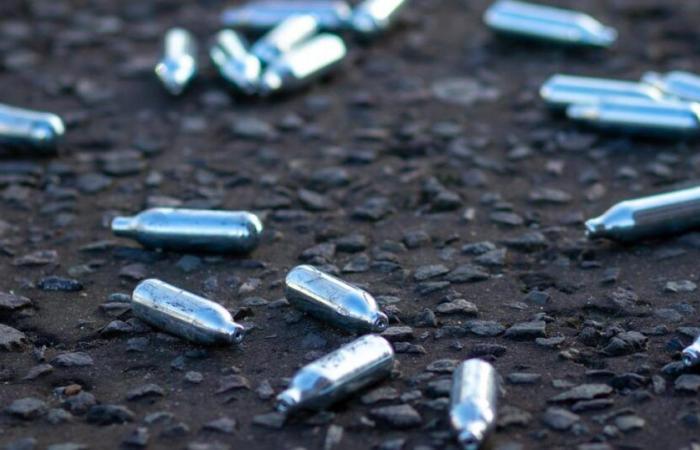
The Hospices Civils de Lyon (HCL) inaugurated on Tuesday a teleconsultation service for consumers of nitrous oxide, coupled with tele-expertise from specialized neurologists. Objective: to create a treatment system for this addiction.
Le Figaro Lyon
Faced with the increase in serious cases, Lyon hospitals have decided to take the bull by the horns. The Hospices Civils de Lyon (HCL) hospital group inaugurated on Tuesday a teleconsultation system for consumers of nitrous oxide, this laughing gas that can cause dangerous brain damage. Unique in France, it is intended to detect abusive consumption, which is increasing, particularly in the Lyon region.
“Still marginal five years ago, the recreational use of nitrous oxide – the famous laughing gas most often inhaled through balloons – is exploding in France, particularly among those under 25, indicate HCLs. Potentially addictive, it can be particularly dangerous and cause irreversible damage to the nervous system.. Behind the euphoric giggles that it provokes in the user, nitrous oxide activates pleasure receptors, creating a “emotional dependence”. However, the multiplication of doses carries a risk since a neurotoxic effect has been observed, which can lead to paralysis of the limbs.
Serious cases and deaths
More than thirty patients have had to be hospitalized since the start of the year at the Pierre Wertheimer neurological hospital in Bron. Among them, a 22-year-old young man forced to walk with crutches; another, 16 years old, suffering from severe neurological disorders or a teenager so addicted that she consumed protoxide during her stay in follow-up care and rehabilitation. “In addition to clinical cases of young patients who can no longer walk because the nervous system is damaged, cases of death linked to nitrous oxide have been reportedalarms Dr. Christophe Riou, addictologist at Pierre Wertheimer. And, even without going that far, what state will a current consumer be in twenty years from now? There is reason to be worried.”
The recreational use of N2O gas has been known since the 19th century, but remained marginal until the end of the 2010s. “Since 2019, the number of files processed has increased 20-fold”specifies Dr Alexandra Boucher, pharmacist responsible for the HCL addictovigilance center. The Lyon HCL poison control center received 80 calls in 2022 for health reasons linked to nitrous oxide, compared to just one in 2017. These are only clinical cases, “the tip of the iceberg”worries Dr. Boucher. Inhaling nitrous oxide in balloons most of the time can also cause skin and mucous membrane lesions, and even hypoxic syncope.
“Laughing gas no longer makes you laugh”
According to a study by Santé Publique France, in 2022, consumption particularly jumped during the Covid pandemic, particularly among young people. If 4.3% of French people say they have consumed it in their life, this proportion was multiplied by three (13.7%) among 18-24 year olds. “Despite several national and regional prevention campaigns, its consumption does not seem to be drying up”the HCLs are alarmed. Sold freely in cartridges or bottles for food but also medical use, protoxide has long been easy to obtain, enjoying a reputation as a harmless drug, wrongly so. The sale to minors was prohibited in 2021 and the purchase limited to ten cartridges, but “a real market continues to develop, with products marketed to young users”.
Faced with the scale of the phenomenon, addictologists have specialized in the treatment of patients suffering from the effects of nitrous oxide. “Laughing gas no longer makes you laugh at allsummarizes Dr Christophe Riou who wears the HCL teleconsultation device. We are dealing with a real public health issue, with significant risks in the event of addictive use.” The HCLs highlight a difficulty in screening, since the first serious symptoms appear as tingling in the arms or legs, and are therefore perceived as mild. Other consumers believe they do not need support.
Also read
Near Lyon: an off-duty police officer dragged 200 meters by a man addicted to nitrous oxide
The aim of the teleconsultation will be to target consumers “at the subclinical stage”. It will be supplemented by a tele-expertise system intended for often disadvantaged health professionals, who will be able to seek advice from HCL specialists. There is no replacement treatment to treat the withdrawal symptoms linked to stopping taking nitrous oxide, although this is the only way to avoid the toxic effects. But support is possible.





